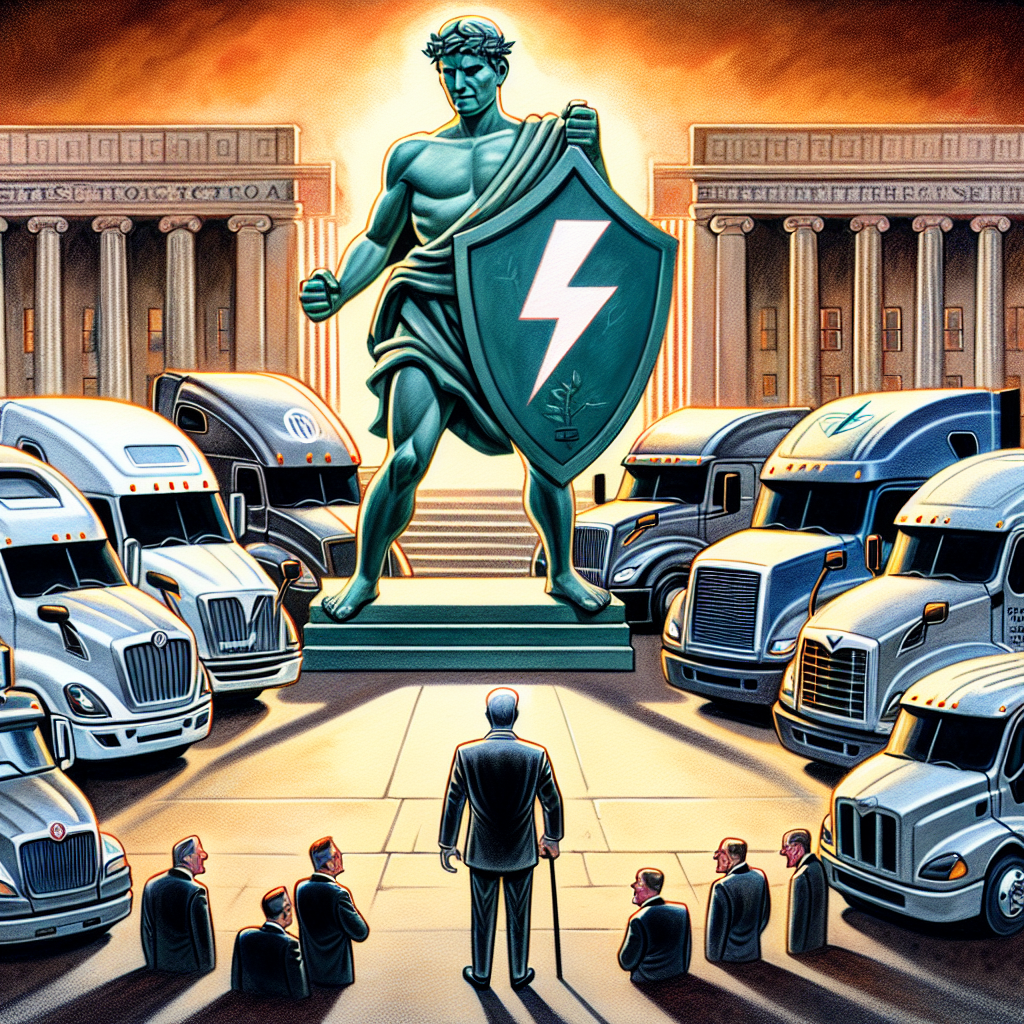“Driving Fair Competition: Nebraska Challenges Electric Truck Giants in Antitrust Battle”
Introduction
In a significant legal development, the state of Nebraska has initiated a lawsuit against several major truck manufacturers, alleging antitrust violations related to electric vehicles (EVs). The lawsuit claims that these manufacturers have engaged in anti-competitive practices that stifle innovation and limit consumer choice in the burgeoning electric truck market. Nebraska’s legal action underscores growing concerns about monopolistic behavior in the automotive industry, particularly as it transitions towards more sustainable and environmentally friendly technologies. The case highlights the tension between traditional automotive giants and the emerging EV sector, raising important questions about market dynamics, competition, and the future of transportation.
Nebraska’s Legal Battle: Understanding the Antitrust Concerns Against Truck Manufacturers
Nebraska has recently taken a bold step in the realm of antitrust law by filing a lawsuit against several major truck manufacturers, alleging that these companies have engaged in practices that stifle competition in the burgeoning electric vehicle (EV) market. This legal action underscores the growing tension between traditional automotive giants and the evolving landscape of electric transportation, which is increasingly seen as a critical component of future mobility solutions. The lawsuit, which has captured national attention, raises important questions about market dynamics, competition, and the role of regulatory frameworks in fostering innovation.
At the heart of Nebraska’s legal battle is the assertion that certain truck manufacturers have colluded to limit the entry and expansion of new competitors in the electric truck sector. The state argues that these companies have engaged in practices such as exclusive supply agreements, strategic acquisitions, and other anti-competitive behaviors that effectively create barriers to entry for smaller, innovative firms. By doing so, Nebraska contends that these manufacturers are not only hindering competition but also delaying the widespread adoption of electric trucks, which are crucial for reducing carbon emissions and achieving environmental sustainability goals.
The implications of this lawsuit extend beyond the borders of Nebraska, as it highlights a broader concern about the concentration of market power in the hands of a few dominant players. In recent years, the automotive industry has witnessed a significant shift towards electrification, driven by technological advancements, consumer demand, and regulatory pressures to reduce greenhouse gas emissions. However, this transition has also exposed vulnerabilities in the market structure, where established manufacturers may leverage their existing dominance to suppress emerging competitors. Nebraska’s legal action seeks to address these concerns by advocating for a more level playing field that encourages innovation and competition.
Moreover, the lawsuit brings to light the complex interplay between state and federal antitrust laws. While federal agencies such as the Federal Trade Commission (FTC) and the Department of Justice (DOJ) play a pivotal role in enforcing antitrust regulations, states have increasingly taken the initiative to address anti-competitive practices within their jurisdictions. Nebraska’s decision to pursue legal action independently reflects a growing trend among states to assert their authority in safeguarding competitive markets, particularly in industries undergoing rapid transformation.
As the case unfolds, it is likely to spark a broader debate about the future of the electric vehicle market and the role of antitrust enforcement in promoting innovation. Proponents of the lawsuit argue that robust competition is essential for driving technological advancements and reducing costs, ultimately benefiting consumers and the environment. On the other hand, critics may contend that the lawsuit could stifle collaboration and investment in the electric truck sector, potentially slowing down the transition to cleaner transportation solutions.
In conclusion, Nebraska’s lawsuit against truck manufacturers over electric vehicle antitrust concerns represents a significant development in the ongoing discourse about competition and innovation in the automotive industry. By challenging the practices of established players, the state aims to ensure that the electric vehicle market remains dynamic and open to new entrants. As the legal proceedings progress, the outcome of this case could have far-reaching implications for the future of electric transportation and the regulatory landscape that governs it. Ultimately, the resolution of this legal battle will serve as a critical test of how antitrust principles are applied in an era of rapid technological change and environmental imperatives.
Electric Vehicle Market Disruption: Nebraska’s Lawsuit and Its Implications
In a significant development within the electric vehicle (EV) industry, Nebraska has initiated legal action against several prominent truck manufacturers, alleging antitrust violations that could have far-reaching implications for the market. This lawsuit underscores the growing tensions between traditional automotive manufacturers and the burgeoning electric vehicle sector, highlighting the complexities of transitioning to a more sustainable transportation future. As the demand for electric vehicles continues to rise, the legal landscape is becoming increasingly intricate, with states like Nebraska taking a proactive stance in addressing potential monopolistic practices.
The lawsuit filed by Nebraska centers on the assertion that certain truck manufacturers have engaged in anti-competitive behavior, potentially stifling innovation and limiting consumer choice in the electric vehicle market. By allegedly colluding to control the supply and pricing of electric trucks, these manufacturers are accused of creating barriers to entry for new competitors, thereby hindering the overall growth of the EV sector. This legal action reflects broader concerns about the concentration of power within the automotive industry, particularly as it undergoes a transformative shift towards electrification.
Nebraska’s decision to pursue this lawsuit is indicative of a larger trend among states seeking to ensure fair competition in the rapidly evolving electric vehicle market. As more states adopt ambitious climate goals and promote the adoption of electric vehicles, there is an increasing emphasis on fostering a competitive environment that encourages innovation and drives down costs for consumers. By challenging the practices of established truck manufacturers, Nebraska aims to set a precedent that could influence how other states approach similar issues in the future.
Moreover, this lawsuit comes at a time when the electric vehicle market is experiencing unprecedented growth, driven by advancements in technology, changing consumer preferences, and supportive government policies. The transition from internal combustion engines to electric powertrains represents a paradigm shift for the automotive industry, with significant implications for manufacturers, suppliers, and consumers alike. As such, ensuring a level playing field is crucial to maintaining the momentum of this transition and achieving broader environmental and economic objectives.
In addition to its potential impact on the electric vehicle market, Nebraska’s lawsuit raises important questions about the role of regulation in fostering competition and innovation. While antitrust laws are designed to prevent monopolistic practices and promote fair competition, their application in the context of emerging technologies can be complex and contentious. This case could serve as a litmus test for how regulators and courts interpret and enforce antitrust laws in the context of the rapidly evolving electric vehicle industry.
Furthermore, the outcome of this lawsuit could have significant implications for consumers, who stand to benefit from increased competition and innovation in the electric vehicle market. By challenging the practices of established manufacturers, Nebraska is advocating for a more diverse and dynamic marketplace, where new entrants can thrive and offer consumers a wider range of choices. This, in turn, could lead to more affordable and accessible electric vehicles, accelerating the transition to a more sustainable transportation system.
In conclusion, Nebraska’s lawsuit against truck manufacturers over electric vehicle antitrust concerns represents a pivotal moment in the ongoing evolution of the automotive industry. As the electric vehicle market continues to expand, ensuring fair competition and preventing anti-competitive practices will be essential to fostering innovation and achieving broader environmental goals. This legal action not only highlights the challenges and opportunities associated with the transition to electric vehicles but also underscores the critical role of regulation in shaping the future of transportation.
Antitrust Laws and Electric Trucks: A Deep Dive into Nebraska’s Legal Action
In a significant legal development, the state of Nebraska has initiated a lawsuit against several prominent truck manufacturers, alleging violations of antitrust laws in the burgeoning electric vehicle (EV) market. This legal action underscores the growing tension between traditional automotive giants and the evolving landscape of electric transportation. As the demand for electric trucks surges, Nebraska’s lawsuit highlights concerns over potential monopolistic practices that could stifle competition and innovation in this critical sector.
The lawsuit, filed in a federal court, accuses the manufacturers of engaging in anti-competitive behavior by colluding to control the supply and pricing of electric trucks. Nebraska’s Attorney General argues that these practices not only harm consumers by limiting their choices but also hinder smaller companies from entering the market. This legal action is particularly noteworthy as it comes at a time when the transition to electric vehicles is seen as essential for reducing carbon emissions and combating climate change.
Central to Nebraska’s case is the assertion that the truck manufacturers have formed an unlawful alliance to dominate the electric truck market. The state alleges that these companies have engaged in practices such as price-fixing, restricting access to essential technology, and creating barriers to entry for new competitors. By doing so, the manufacturers are accused of maintaining an unfair advantage, which could lead to higher prices and reduced innovation in the long run.
Moreover, Nebraska’s lawsuit raises important questions about the role of antitrust laws in the context of emerging technologies. As the automotive industry undergoes a transformative shift towards electrification, ensuring fair competition becomes increasingly crucial. Antitrust laws, designed to prevent monopolies and promote competition, must adapt to address the unique challenges posed by the rapid advancement of technology and the consolidation of market power among a few dominant players.
In response to the lawsuit, the truck manufacturers have denied any wrongdoing, asserting that their actions are in compliance with existing regulations. They argue that collaboration is necessary to overcome the technical and financial challenges associated with developing electric trucks. Furthermore, they contend that their efforts to standardize technology and infrastructure are aimed at accelerating the adoption of electric vehicles, ultimately benefiting consumers and the environment.
Nevertheless, Nebraska’s legal action has sparked a broader debate about the balance between collaboration and competition in the EV market. While cooperation among manufacturers can lead to technological advancements and economies of scale, it is essential to ensure that such collaboration does not cross the line into anti-competitive behavior. The outcome of this lawsuit could set a precedent for how antitrust laws are applied to the rapidly evolving electric vehicle industry.
As the case unfolds, it will be closely watched by industry stakeholders, policymakers, and legal experts alike. The implications of Nebraska’s lawsuit extend beyond the state’s borders, potentially influencing regulatory approaches to antitrust issues in the EV market nationwide. Ultimately, the resolution of this legal battle could shape the future of competition and innovation in the electric truck sector, impacting the pace and direction of the transition to sustainable transportation.
In conclusion, Nebraska’s lawsuit against truck manufacturers over electric vehicle antitrust concerns highlights the complex interplay between competition, collaboration, and innovation in the rapidly evolving automotive industry. As the world moves towards a more sustainable future, ensuring fair competition in the electric vehicle market will be crucial for fostering innovation and providing consumers with diverse and affordable options.
The Future of Electric Trucks: How Nebraska’s Lawsuit Could Change the Industry

Nebraska’s recent lawsuit against major truck manufacturers has sent ripples through the burgeoning electric vehicle (EV) industry, raising questions about the future of electric trucks and the competitive landscape within this rapidly evolving sector. The state alleges that several prominent truck manufacturers have engaged in antitrust practices, potentially stifling innovation and limiting consumer choice in the electric truck market. This legal action underscores the growing importance of regulatory oversight as traditional automotive giants transition to electric technologies.
The lawsuit, filed in a Nebraska district court, accuses these manufacturers of colluding to control the supply chain and distribution networks for electric trucks. By allegedly engaging in such practices, these companies could be hindering smaller competitors and new entrants from gaining a foothold in the market. This, in turn, could slow the overall adoption of electric trucks, which are seen as a crucial component in reducing carbon emissions and combating climate change. As the world increasingly shifts towards sustainable transportation solutions, ensuring a competitive market is vital for fostering innovation and driving down costs for consumers.
Nebraska’s legal action highlights the delicate balance between fostering innovation and maintaining fair competition. On one hand, the development of electric trucks requires significant investment in research and development, infrastructure, and technology. Large manufacturers, with their substantial resources, are well-positioned to lead this charge. However, if these companies engage in anticompetitive practices, they could create barriers that prevent smaller firms from contributing to the industry’s growth. This could lead to a market dominated by a few key players, potentially stifling the diversity of ideas and solutions necessary for the sector’s advancement.
Moreover, the lawsuit raises broader questions about the role of government regulation in the EV industry. As electric vehicles become more mainstream, regulatory bodies will need to ensure that the market remains open and competitive. This involves not only addressing antitrust concerns but also considering issues related to intellectual property, standardization, and consumer protection. By taking legal action, Nebraska is signaling the need for vigilance in overseeing the industry’s development, ensuring that it evolves in a manner that benefits both consumers and the environment.
The outcome of this lawsuit could have significant implications for the future of electric trucks. If Nebraska’s claims are upheld, it could lead to increased scrutiny of business practices within the industry, prompting other states or federal agencies to take similar actions. This could result in a more level playing field, encouraging innovation and competition among manufacturers. On the other hand, if the lawsuit is dismissed, it may embolden larger companies to continue their current practices, potentially slowing the pace of change in the market.
In conclusion, Nebraska’s lawsuit against truck manufacturers over antitrust concerns serves as a pivotal moment for the electric vehicle industry. It underscores the importance of maintaining a competitive market as the world transitions to sustainable transportation solutions. The legal proceedings will likely shape the future landscape of electric trucks, influencing how companies operate and compete in this dynamic sector. As the case unfolds, stakeholders across the industry will be watching closely, aware that its outcome could set a precedent for how antitrust issues are addressed in the evolving world of electric vehicles.
Nebraska’s Stand Against Truck Manufacturers: A Closer Look at the Antitrust Allegations
Nebraska has recently taken a bold step in the realm of antitrust law by filing a lawsuit against several major truck manufacturers, alleging that these companies have engaged in practices that stifle competition in the burgeoning electric vehicle (EV) market. This legal action underscores the growing tension between traditional automotive giants and the evolving landscape of electric transportation, highlighting the challenges that states face in ensuring fair competition and consumer choice.
The lawsuit, filed in a Nebraska district court, accuses the truck manufacturers of colluding to limit the availability and distribution of electric trucks, thereby hindering the market’s natural progression towards more sustainable transportation solutions. Nebraska’s Attorney General has argued that these practices not only violate antitrust laws but also impede the state’s efforts to reduce carbon emissions and promote environmental sustainability. By taking this legal action, Nebraska aims to dismantle any barriers that prevent new entrants from competing in the electric truck market, thereby fostering innovation and driving down costs for consumers.
Central to Nebraska’s allegations is the claim that the truck manufacturers have engaged in exclusive agreements with suppliers and dealers, effectively creating a bottleneck that restricts the flow of electric trucks into the market. These agreements, according to the lawsuit, have the effect of maintaining the status quo, where traditional diesel and gasoline-powered trucks dominate the industry. By limiting the availability of electric alternatives, the manufacturers are accused of depriving consumers of the benefits associated with electric vehicles, such as lower operating costs and reduced environmental impact.
Moreover, Nebraska’s lawsuit highlights the broader implications of such anticompetitive behavior on the national stage. As the United States strives to meet ambitious climate goals, the transition to electric vehicles is seen as a critical component of reducing greenhouse gas emissions. However, if major players in the automotive industry are allowed to engage in practices that stifle competition, the pace of this transition could be significantly hampered. This case, therefore, serves as a litmus test for how antitrust laws can be applied to ensure that the market for electric vehicles remains open and competitive.
In response to the lawsuit, the truck manufacturers have denied any wrongdoing, asserting that their business practices are in full compliance with antitrust regulations. They argue that the agreements in question are standard industry practices designed to ensure quality and reliability in the supply chain. Furthermore, they contend that the electric vehicle market is still in its nascent stages and that any perceived limitations in availability are due to technological and logistical challenges rather than deliberate anticompetitive conduct.
As the legal proceedings unfold, the outcome of Nebraska’s lawsuit could have far-reaching consequences for the electric vehicle industry. A ruling in favor of the state could pave the way for increased regulatory scrutiny of automotive manufacturers and their business practices, potentially leading to more stringent antitrust enforcement in the sector. Conversely, a decision favoring the manufacturers might embolden other companies to engage in similar practices, potentially slowing the adoption of electric vehicles across the country.
In conclusion, Nebraska’s lawsuit against truck manufacturers over electric vehicle antitrust concerns represents a significant moment in the ongoing evolution of the automotive industry. By challenging the practices of established players, the state seeks to ensure that the transition to electric vehicles is not only swift but also equitable and competitive. As the case progresses, it will undoubtedly serve as a critical reference point for policymakers, industry stakeholders, and consumers alike, shaping the future of transportation in Nebraska and beyond.
Legal Challenges in the EV Sector: Nebraska’s Case Against Truck Manufacturers
In a significant development within the electric vehicle (EV) sector, the state of Nebraska has initiated legal proceedings against several prominent truck manufacturers, alleging antitrust violations. This lawsuit underscores the growing tensions between traditional automotive manufacturers and emerging technologies, as states and companies navigate the complex landscape of transitioning to electric vehicles. Nebraska’s legal action is rooted in concerns that certain truck manufacturers are engaging in practices that stifle competition and innovation in the burgeoning EV market. The state contends that these manufacturers have formed an alliance to control the supply chain, limit market entry for new competitors, and manipulate pricing structures to their advantage. Such actions, Nebraska argues, not only hinder the growth of the EV sector but also impede the state’s efforts to promote sustainable transportation solutions.
The lawsuit highlights the intricate dynamics at play in the EV industry, where traditional manufacturers are grappling with the rapid shift towards electrification. As the demand for electric vehicles continues to rise, driven by environmental concerns and regulatory pressures, established truck manufacturers are facing increased competition from new entrants and tech companies eager to capitalize on this transformative trend. Nebraska’s case brings to light the challenges that arise when established players in the automotive industry attempt to maintain their dominance in a rapidly evolving market. The state’s legal team asserts that the alleged antitrust practices have far-reaching implications, not only for the EV sector but also for consumers and the broader economy. By restricting competition, these manufacturers are accused of limiting consumer choice and stifling innovation, ultimately slowing the transition to cleaner, more efficient transportation options.
Moreover, Nebraska’s lawsuit is emblematic of a broader trend where states are taking a more active role in regulating the EV market and ensuring fair competition. As the federal government continues to develop comprehensive policies to support the transition to electric vehicles, states are increasingly stepping in to address specific concerns and protect their interests. This case could set a precedent for other states to follow, potentially leading to a wave of similar legal actions across the country. The outcome of Nebraska’s lawsuit could have significant implications for the future of the EV industry, influencing how manufacturers approach competition and collaboration in this rapidly changing landscape. If successful, the case could prompt truck manufacturers to reevaluate their strategies and adopt more transparent and competitive practices, fostering a more dynamic and innovative market environment.
In addition to its potential impact on the EV sector, Nebraska’s legal action also raises important questions about the role of antitrust laws in the context of emerging technologies. As industries undergo digital transformation and new business models emerge, regulators and policymakers must adapt existing frameworks to address the unique challenges posed by these developments. The Nebraska lawsuit serves as a reminder of the need for a balanced approach that encourages innovation while safeguarding against anti-competitive behavior. As the case unfolds, it will be closely watched by industry stakeholders, policymakers, and legal experts alike, all of whom have a vested interest in the outcome. Ultimately, Nebraska’s lawsuit against truck manufacturers over electric vehicle antitrust concerns highlights the complex interplay between regulation, competition, and innovation in the EV sector. As the industry continues to evolve, it will be crucial for all parties involved to navigate these challenges thoughtfully and collaboratively, ensuring a fair and sustainable transition to a cleaner transportation future.
The Impact of Nebraska’s Lawsuit on the Electric Vehicle Market and Competition
Nebraska’s recent lawsuit against major truck manufacturers has sent ripples through the electric vehicle (EV) market, raising significant questions about competition and antitrust practices. The state alleges that these manufacturers have engaged in anti-competitive behavior, potentially stifling innovation and limiting consumer choice in the burgeoning electric truck sector. This legal action underscores the growing tension between traditional automotive giants and the evolving landscape of electric vehicles, which are increasingly seen as the future of transportation.
The lawsuit claims that certain truck manufacturers have colluded to control the supply and pricing of electric trucks, thereby hindering smaller competitors from gaining a foothold in the market. This alleged collusion could have far-reaching implications, not only for the manufacturers involved but also for the broader EV market. If Nebraska’s claims hold true, it could lead to increased scrutiny of business practices within the industry, prompting regulatory bodies to take a closer look at how these companies operate.
Moreover, the lawsuit highlights the challenges faced by new entrants in the electric vehicle market. Smaller companies often struggle to compete with established manufacturers that have significant resources and established supply chains. By allegedly engaging in anti-competitive practices, these larger companies may be creating barriers that prevent innovation and limit the diversity of options available to consumers. This, in turn, could slow the overall adoption of electric vehicles, as potential buyers may find fewer choices and higher prices than they would in a more competitive market.
In addition to its potential impact on competition, Nebraska’s lawsuit also raises important questions about the role of government in regulating the electric vehicle industry. As the market for electric vehicles continues to grow, there is an increasing need for clear and effective regulatory frameworks that ensure fair competition and protect consumer interests. This case could serve as a catalyst for policymakers to reevaluate existing regulations and consider new measures to promote a level playing field in the EV market.
Furthermore, the outcome of this lawsuit could influence the strategies of other states and regions as they navigate the transition to electric vehicles. If Nebraska is successful in its legal challenge, it may embolden other states to pursue similar actions, potentially leading to a wave of antitrust litigation across the country. This could create a more challenging environment for truck manufacturers, forcing them to adapt their business practices to comply with stricter regulations and avoid further legal entanglements.
On the other hand, if the lawsuit is unsuccessful, it may signal to manufacturers that their current practices are permissible, potentially allowing them to continue operating in ways that could limit competition. This outcome could have a chilling effect on innovation within the electric vehicle market, as smaller companies may find it increasingly difficult to compete against entrenched industry leaders.
In conclusion, Nebraska’s lawsuit against truck manufacturers over electric vehicle antitrust concerns is a pivotal moment for the industry. It highlights the complex interplay between competition, regulation, and innovation in the rapidly evolving EV market. As the case unfolds, it will be closely watched by industry stakeholders, policymakers, and consumers alike, all of whom have a vested interest in ensuring that the transition to electric vehicles is both fair and beneficial for all parties involved. The ultimate resolution of this legal challenge could have lasting implications for the future of transportation and the competitive dynamics of the electric vehicle market.
Q&A
1. **What is the lawsuit about?**
Nebraska is suing truck manufacturers over concerns that they are engaging in antitrust practices related to electric vehicles.
2. **Who are the defendants in the lawsuit?**
The defendants are major truck manufacturers, though specific names are not provided in the prompt.
3. **What are the antitrust concerns?**
The concerns involve potential collusion or unfair practices that could limit competition in the electric vehicle market.
4. **What is Nebraska seeking through the lawsuit?**
Nebraska is likely seeking legal remedies to ensure fair competition and possibly financial penalties or changes in business practices from the manufacturers.
5. **How might this lawsuit impact the electric vehicle market?**
If successful, the lawsuit could lead to increased competition and innovation in the electric vehicle market.
6. **What legal grounds is Nebraska using for the lawsuit?**
Nebraska is likely using state and federal antitrust laws as the basis for their legal action.
7. **Has there been any response from the truck manufacturers?**
The prompt does not provide information on the manufacturers’ responses, but they may deny the allegations or seek to settle the case.
Conclusion
Nebraska’s lawsuit against truck manufacturers over electric vehicle antitrust concerns highlights the state’s apprehension about potential anti-competitive practices in the burgeoning electric vehicle market. The legal action underscores the importance of ensuring fair competition and preventing monopolistic behavior as the industry transitions from traditional internal combustion engines to electric powertrains. By addressing these concerns, Nebraska aims to protect consumer interests, promote innovation, and ensure a level playing field for all manufacturers. The outcome of this lawsuit could set a significant precedent for how antitrust laws are applied in the evolving landscape of electric vehicles, potentially influencing regulatory approaches and industry practices nationwide.





